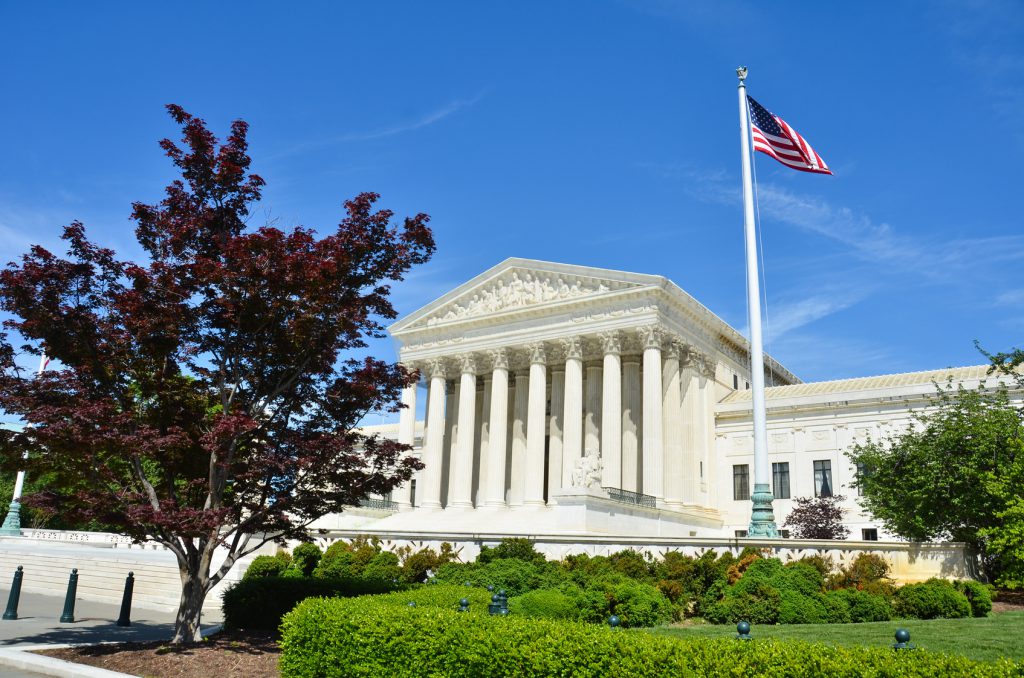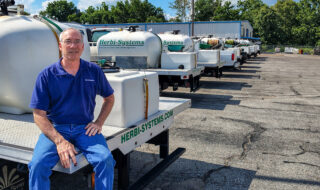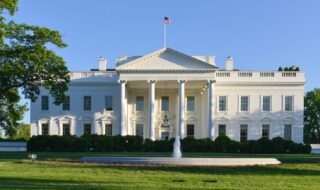Sackett v. EPA – Supreme Court to Finally Clarify WOTUS Once and For All – Maybe?
Sackett v. EPA – Supreme Court to Finally Clarify WOTUS Once and For All – Maybe?
September 22, 2022 Last Edit: June 5, 2025
Sackett v. EPA – Supreme Court to Finally Clarify WOTUS Once and For All – Maybe?

Many small business owners are acutely aware of the Waters of the United States (WOTUS) issue. On October 3, 2022, the Supreme Court will kick off its new year with oral arguments in Sackett v. Environmental Protection Agency, No. 21-454 and hopefully provide some clarity to the longstanding confusion over when the Environmental Protection Agency (EPA) can regulate wetlands on private property. The NFIB Small Business Legal Center (Legal Center) has strongly urged the Court to reaffirm the importance of property rights while putting an end to abusive EPA claims of regulatory power.
Background
Congress Acts
In 1948, the Federal Water Pollution Control Act (FWCPA) was the first major piece of US legislation passed to address water pollution. A few decades later, Congress enacted the Federal Water Pollution Control Act Amendments of 1972. The original FWPCA, the sweeping amendments of 1972, and subsequent amendments have come to be known as the Clean Water Act (CWA or Act).
The objective of the CWA is “to restore and maintain the chemical, physical, and biological integrity of the Nation’s waters.” 33 U.S.C. § 1251(a). Congress tasked the EPA with administering and enforcing the CWA. The Act prohibits the discharge of a pollutant by any person, without a permit, from a point source into navigable waters. §§ 1311(a), §§ 1362(12). The CWA defines “discharge of a pollutant,” “pollutant,” “person,” and “point source.” But most relevant, the phrase “navigable waters” is defined as the “waters of the United States” (WOTUS). § 1362(7). Because the Act’s prohibitions extend only to “navigable waters,” defined as the “waters of the United States,” the EPA’s regulatory enforcement of the Act extends only that far as well. In sum, EPA can only regulate those waters that are “waters of the United States.”
SCOTUS Enters the Fray
The Supreme Court’s first interpretation of “waters of the United States” came in United States v. Riverside Bayview Homes, Inc. The Court held the EPA’s interpretation of “waters of the United States” to include wetlands that “actually abut[ted]” navigable waters, was permissible. In the years following Riverside Bayview Homes, the EPA claimed unlimited authority—broadening its WOTUS interpretation to include ephemeral streams, drainage ditches, and any intrastate waters used as a habitat by birds. In 2001 the Court rightfully brought the EPA back down to reality, concluding in Solid Waste Agency of Northern Cook County v. U.S. Army Corps of Engineers that WOTUS does not include “nonnavigable, isolated, intrastate waters.”
Finally, in Rapanos v. United States, the Court deadlocked on the proper test for when a wetland qualifies as a water of the United States:
- A four-justice plurality led by Justice Scalia determined that “waters of the United States” means “relatively permanent, standing or continuously flowing bodies of water” normally described as streams, oceans, rivers, or lakes, but not intermittent channels or those providing drainage from rainfall. The plurality’s test for wetlands required a “continuous surface connection” to a water of the United States for the wetland to be covered by the Act.
- Justice Kennedy concurred in the judgment, concluding instead that the proper test was whether the at-issue wetland has a “significant nexus” with waters of the United States.
- Four other justices dissented, arguing that the Court should defer to the EPA in its claim of unbridled regulatory authority.
Executive Ping-Pong
Without a statutory definition or clear Supreme Court interpretation, “waters of the United States,” and by extension the EPA’s jurisdiction, has been subject to the whimsical policy preferences of each new administration. Perhaps no policy fight better highlights Justice Kagan’s comment that “[w]e live today in an era of presidential administration.”
In the 2015 Clean Water Rule, the Obama Administration adopted Justice Kennedy’s “significant nexus” test to broadly define “waters of the United States.” Partially relying on the “agencies’ technical expertise and experience,” the rule claimed WOTUS encompasses those waters that “either alone or in combination with similarly situated waters in the region, significantly affect the chemical, physical, or biological integrity of traditional navigable waters, interstate waters, or the territorial seas.”
A few years later, the Trump Administration rescinded the Clean Water Rule, instead opting to adopt the four-justice plurality’s test in its Navigable Waters Protection Rule (NWPR). This rule defined WOTUS as “relatively permanent flowing and standing waterbodies that are traditional navigable waters in their own right or that have a specific surface water connection to traditional navigable waters, as well as wetlands that abut or are otherwise inseparably bound up with such relatively permanent waters.”
Unsurprisingly, the Biden Administration scrapped the NWPR in favor of its Revised Definition of “Waters of the United States” Rule. Compounding the confusing regulatory environment, the Biden rule proposes to interpret WOTUS as “[t]raditional navigable waters, interstate waters, and the territorial seas, and their adjacent wetlands; most impoundments of ‘waters of the United States’” and tributaries to, wetlands adjacent to, and “other waters” that meet, traditional navigable waters, interstate waters, territorial seas, or impoundments either under the relatively permanent standard or significant nexus standard.
The Sackett’s Case
In 2004, Michael and Chantell Sackett bought residential property near Priest Lake, Idaho. Their property is sandwiched by roads to the north and south. Across the road to the north is a ditch that drains into a tributary, which then feeds into a creek, which flows along the Sacketts’ property and empties into Priest Lake. Priest Lake lies across the road to the south of their property. There is no surface water connection between their land and the ditch to the north, or their land and Priest Lake.
After jumping through all the bureaucratic hoops to obtain the proper permits, the Sacketts started building their home. But nothing came easy for the Sacketts. The EPA accused the Sacketts of violating the CWA. The agency demanded the Sacketts not only halt construction but restore the property to its original manner. The reasoning? Their property allegedly contained wetlands which were “navigable waters” under the CWA.
The Sacketts challenged the EPA’s claim of authority over their land. The Supreme Court unanimously held in their favor on a non-merits question—landowners can seek judicial review of an EPA claim of authority over their land under the CWA (“Sackett I”).
After the Supreme Court remanded the case for resolution of the merits, the district court used Justice Kennedy’s “significant nexus” test to uphold the EPA’s claim of authority. The Ninth Circuit Court of Appeals agreed, adopting the broad “significant nexus” test as the governing rule of law.
Represented by the Pacific Legal Foundation, the Sacketts again petitioned the Supreme Court for review. The Court granted the petition to determine whether the “Ninth Circuit set forth the proper test for determining whether wetlands are ‘waters of the United States’” (“Sackett II”).
Small Business Impact
The utter chaos and confusion since the Supreme Court’s Rapanos stalemate, and back-and-forth WOTUS interpretations have hit small businesses hard. Left in a state of flux, small businesses don’t know who—or what—they can rely on. Earlier this year, multiple small businesses across the country expressed to the NFIB Legal Center that they refrain from updating and maintaining their land out of fear that anything done will subject them to EPA retribution under the current expansive reading of WOTUS jurisdiction.
This uncertainty is further reflected in the NFIB Research Foundation’s 2020 Small Business Problems and Priorities. In that quadrennial survey, small businesses ranked “Uncertainty over Government Actions” as their 10th most important problem, with 15% of labeling it as “critical.” Moreover, “Unreasonable Government Regulations” like a WOTUS rule encompassing nearly all water settlements whether permanent or temporary, ranked as the 6th most important issue facing small business. “Environmental Regulations (e.g., EPA)” was ranked by 10% as a critical problem. With inflation, supply chain disruption, and labor shortages galore, small businesses have enough to worry about without the EPA hovering over them.
Small businesses opting to wade through the treacherous waters that are the permitting process, beware! Even the Supreme Court has recognized how daunting the CWA permit process can be. A specialized individual permit can take 2 years and cost over $250,000 to obtain, while a more general permit can take roughly 10 months and cost $29,000. But the median small business holds an average cash balance of only $12,000, according to a 2016 study of 600,000 small businesses by JP Morgan.
But the costs don’t stop there. A violation of the CWA can subject a small business to civil damages, a prison term of up to 1 year, and fine between $2,500 and $25,000, per day! Accidentally violate the EPA’s interpretation of the CWA twice? Be ready to pay up to $50,000 per day and spend up to 2 years as a guest in a government prison.
Setting aside these financial, freedom-curtailing, and reliance harms, there is still perhaps the most detrimental aspect of an expansive WOTUS rule—the infringement of fundamental property rights. Under the 2015 Clean Water Rule, a business with seasonal streams or even ditches would need an EPA permit before building, grading, landscaping, dredging, draining, or even adding rocks/soil to the alleged waters.
NFIB’s WOTUS Advocacy
Fighting on behalf of small business property rights, NFIB has vehemently advocated against broad WOTUS interpretations and the EPA’s claim of unbridled authority.
In Rapanos, we urged the Court, successfully, to reject expansive readings of the CWA that would grant EPA limitless authority over privately-owned wetlands.
In Sackett I, the NFIB Legal Center supported the Sacketts by filing an amicus brief urging the Court to grant review and an amicus brief on the merits arguing that the CWA permits judicial review of EPA authority.
When the Obama Administration announced its wide-reaching Clean Water Rule, NFIB sued the EPA and Army Corps of Engineers.
In 2017, NFIB published a WOTUS E-Book, discussing the history, costs, and small business implications of expansive EPA authority.
After the Trump Administration signaled a desire to redefine WOTUS, we submitted comments urging the EPA to adopt a rule both respecting property rights and adopting a Scalia-like common sense bright line test. We supported the Trump Administration’s proposed WOTUS definition as a welcome “Positive First Step” for small businesses due to its clear definition of the federal government’s jurisdiction.
When the Biden Administration announced its intention to rescind the Trump Administration’s Navigable Waters Protection Rule, NFIB submitted comments urging it to retain the NWPR. Additionally, we have set up a Take Action system where small businesses can directly contact their representatives urging them to support retention of the NWPR.
Last year, NFIB held an on-demand WOTUS briefing with Congressman Dan Newhouse (R-WA). As a small business owner and farmer himself, Congressman Newhouse is leading the charge in Congress to protect property rights and rein in the EPA in what he deemed “the most overreaching federal regulation ever put into place.”
In October, we filed an amicus brief with the CATO Institute, urging the Supreme Court to hear Sackett II. Our brief maintained that the WOTUS confusion had gone on long enough, and small businesses needed the Court to step in and protect their reliance interests once and for all. This past April, we filed an amicus brief on the merits, urging the Court not to defer to the EPA in defining “navigable waters” under the CWA.
The Bottom Line
NFIB and the NFIB Small Business Legal Center will continue to fight for small business property rights at every turn. Whether in Congress, the courts, or agency rulemaking, we will hold the EPA’s feet to the fire until they stop using WOTUS as a land grab against small businesses. As John Adams said, “property must be secured, or liberty cannot exist.”
September 23, 2022
NFIB is a member-driven organization advocating on behalf of small and independent businesses nationwide.
Related Articles














